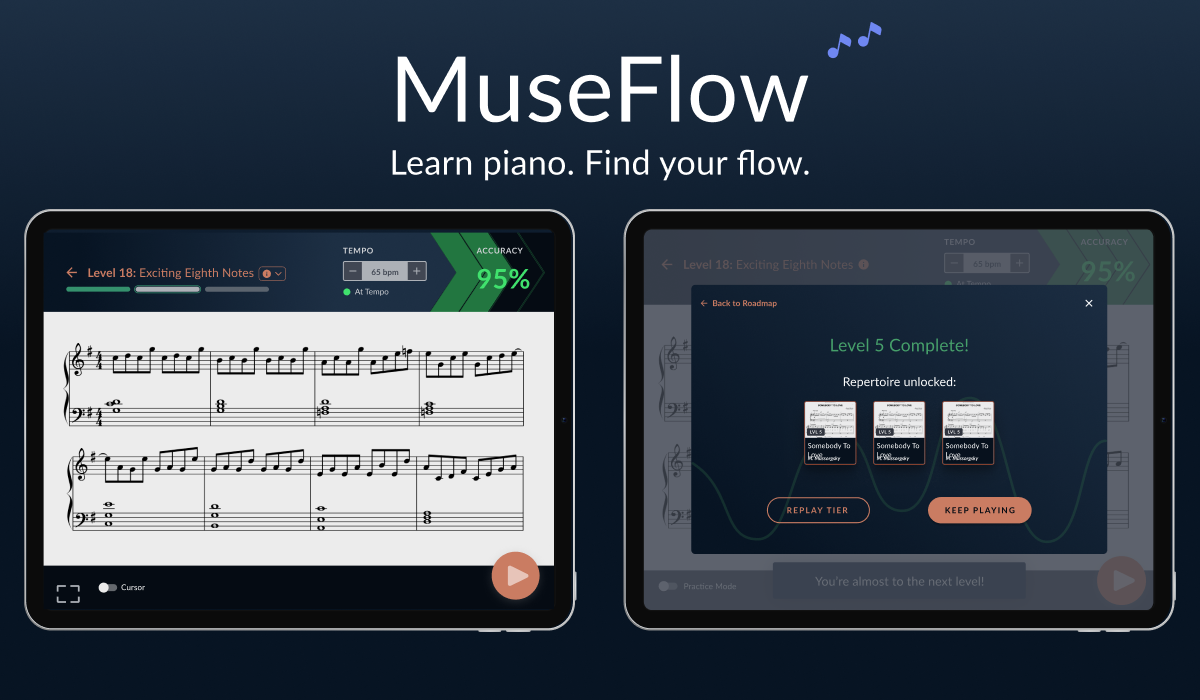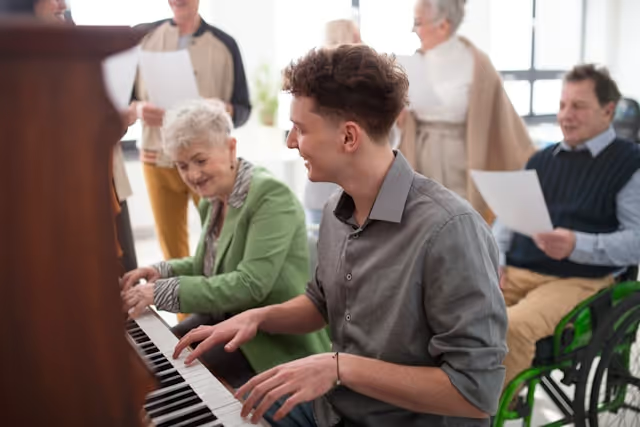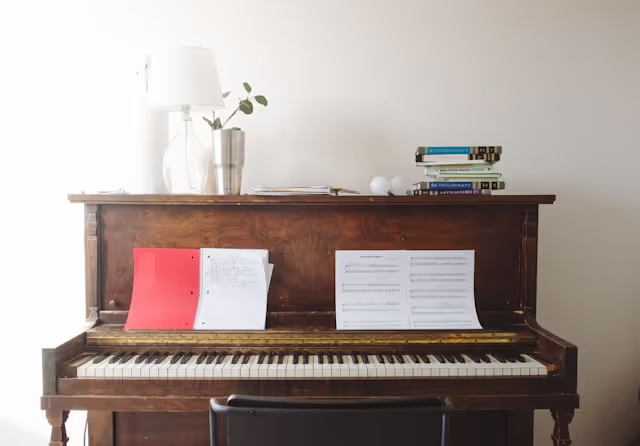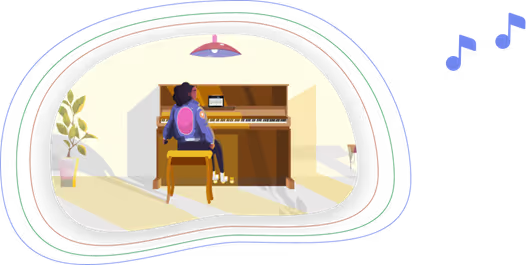.svg)
The Fastest Way to Learn Piano as a Complete Beginner in 2025
What is the fastest way to learn piano? This question has been asked by millions of aspiring musicians, and in 2025, the answer has never been clearer.
If you're a complete beginner wondering about the fastest way to learn piano as a complete beginner, you're about to discover a revolutionary approach that's transforming how people learn music. Gone are the days when learning piano meant years of boring exercises and hoping you'd eventually play something enjoyable.
The fastest way to learn piano in 2025 combines cutting-edge technology, proven learning science, and engaging game-like experiences that make every practice session feel like an adventure.
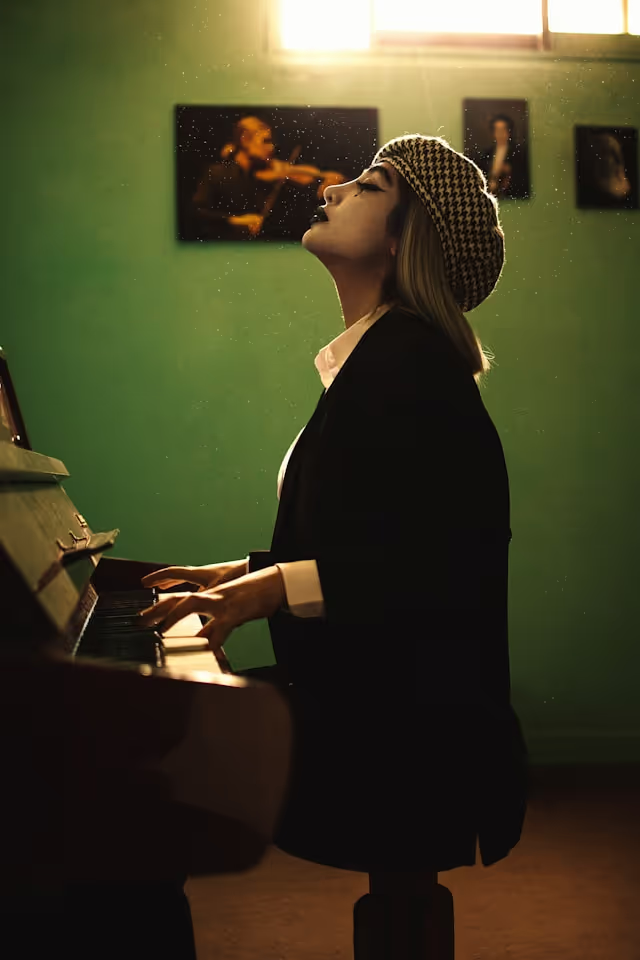
Why Traditional Piano Learning Methods Are Slow
Understanding why traditional methods are inefficient helps explain why modern approaches can accelerate your progress dramatically:
1. The Delayed Feedback Problem
- Traditional lessons provide feedback once a week
- You might practice incorrectly for six days before correction
- Delayed feedback slows learning and reinforces bad habits
- Your brain struggles to connect corrections with specific actions
2. One-Size-Fits-All Curriculum Issues
- Rigid curricula that might be too fast or too slow
- Creates unnecessary barriers and frustration
- No accommodation for individual learning paces
- Leads to boredom or overwhelming difficulty
3. Motivation and Engagement Gap
- Learning scales feels tedious and disconnected
- Boring practice leads to poor retention and slow progress
- Students often give up due to lack of engagement
- No connection to musical expression that inspired learning
4. Sight Reading Neglect
- Most methods treat sight reading as advanced skill
- This approach is fundamentally flawed
- Sight reading is actually the foundation of musical literacy
- Students memorize pieces without developing reading skills
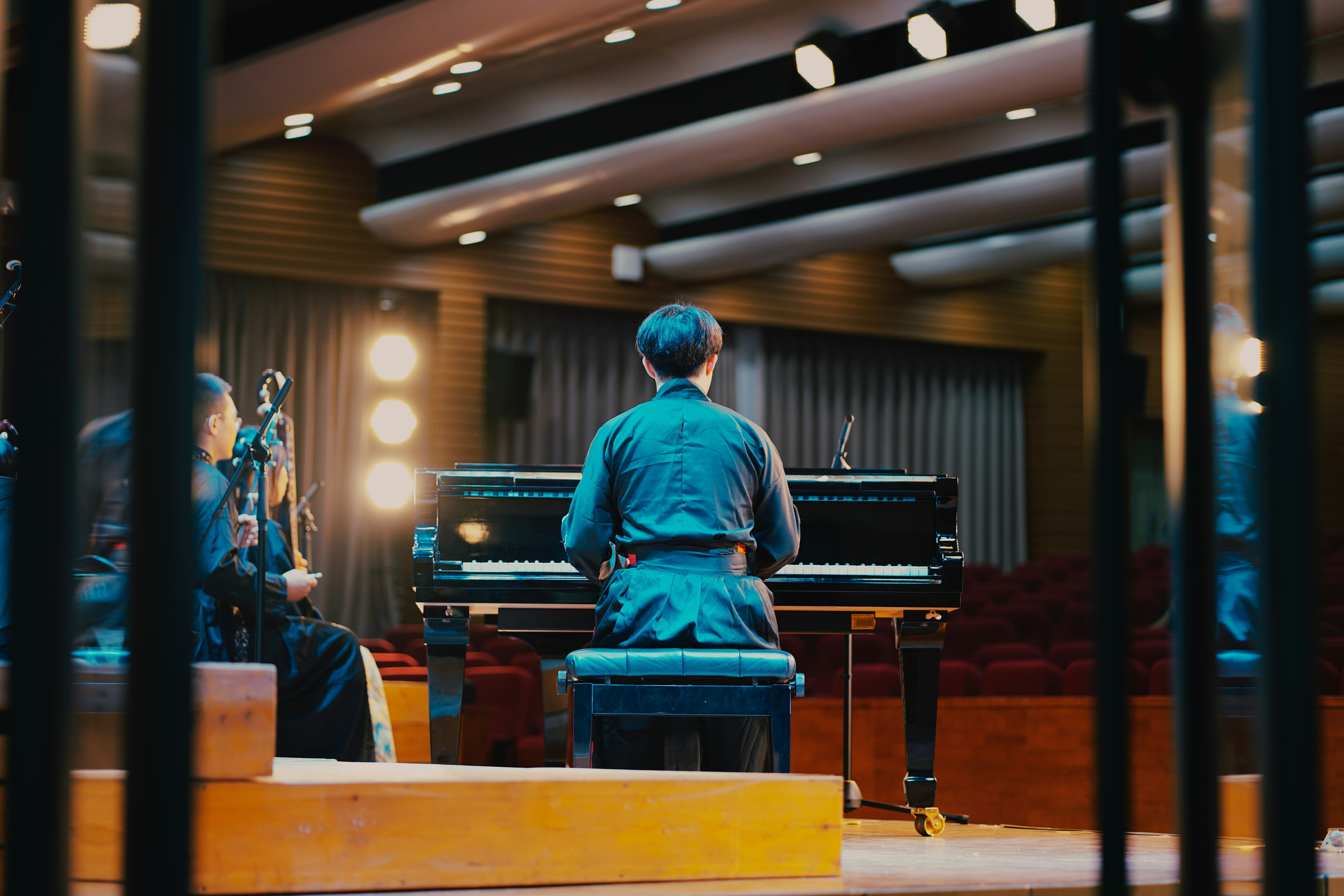
The Science of Accelerated Learning
The fastest way to learn piano leverages proven scientific principles:
Flow State and Optimal Challenge
- Flow occurs when challenge perfectly matches skill level
- Creates complete absorption where learning happens effortlessly
- Time disappears and self-consciousness fades
- Associated with accelerated learning and increased motivation
Immediate Feedback and Memory
- Instant feedback is crucial for effective skill acquisition
- Allows brain to form correct associations immediately
- Prevents development of bad habits
- Accelerates learning by enabling real-time adjustment
Intrinsic Motivation
- Doing something because you find it rewarding leads to better outcomes
- Creates sustainable practice habits
- Students practice because they want to, not because they have to
- Results in faster progress and longer retention

MuseFlow's Revolutionary Approach: The Fastest Way to Learn Piano
MuseFlow represents a complete reimagining of piano education, addressing every limitation of traditional methods while introducing innovations that accelerate learning.
Sight Reading First: Building the Foundation for Speed
The cornerstone of MuseFlow's approach is prioritizing sight reading from the very first lesson. While traditional methods treat it as advanced, MuseFlow recognizes it as the foundation of musical literacy.
Why sight reading first is faster:
- Creates transferable skills that enhance everything else
- Builds musical literacy like learning to read for language
- Enables unlimited repertoire access rather than memorized pieces
- Accelerates pattern recognition and musical understanding
MuseFlow makes sight reading engaging through game-like challenges that feel like rhythm games. You start with simple note recognition and gradually build to complex musical phrases.
Real-Time Feedback System
MuseFlow provides instant feedback on every note you play:
- Hit the right note? Immediate visual and audio confirmation
- Miss a note? Gentle guidance without breaking flow
- Complete a section? Satisfying celebrations reward progress
- Improve timing? Clear feedback builds confidence
This eliminates the delayed feedback problem that slows traditional learning.
Gamification That Builds Real Skills
MuseFlow's game elements are integrated with genuine musical learning:
- Level system corresponds to measurable musical improvements
- Achievement tracking recognizes important skill development
- Progress visualization shows meaningful musical growth
- 95% accuracy requirement emphasizes steady improvement
You can't "game the system" because advancing requires real musical competency.
Flexible Learning Paths
MuseFlow combines open-world and campaign mode game design:
Campaign Mode: Structured path for systematic skill building Open-World Mode: Choose your own adventure based on interests
Both paths build the same foundational sight reading skills that accelerate all future learning.
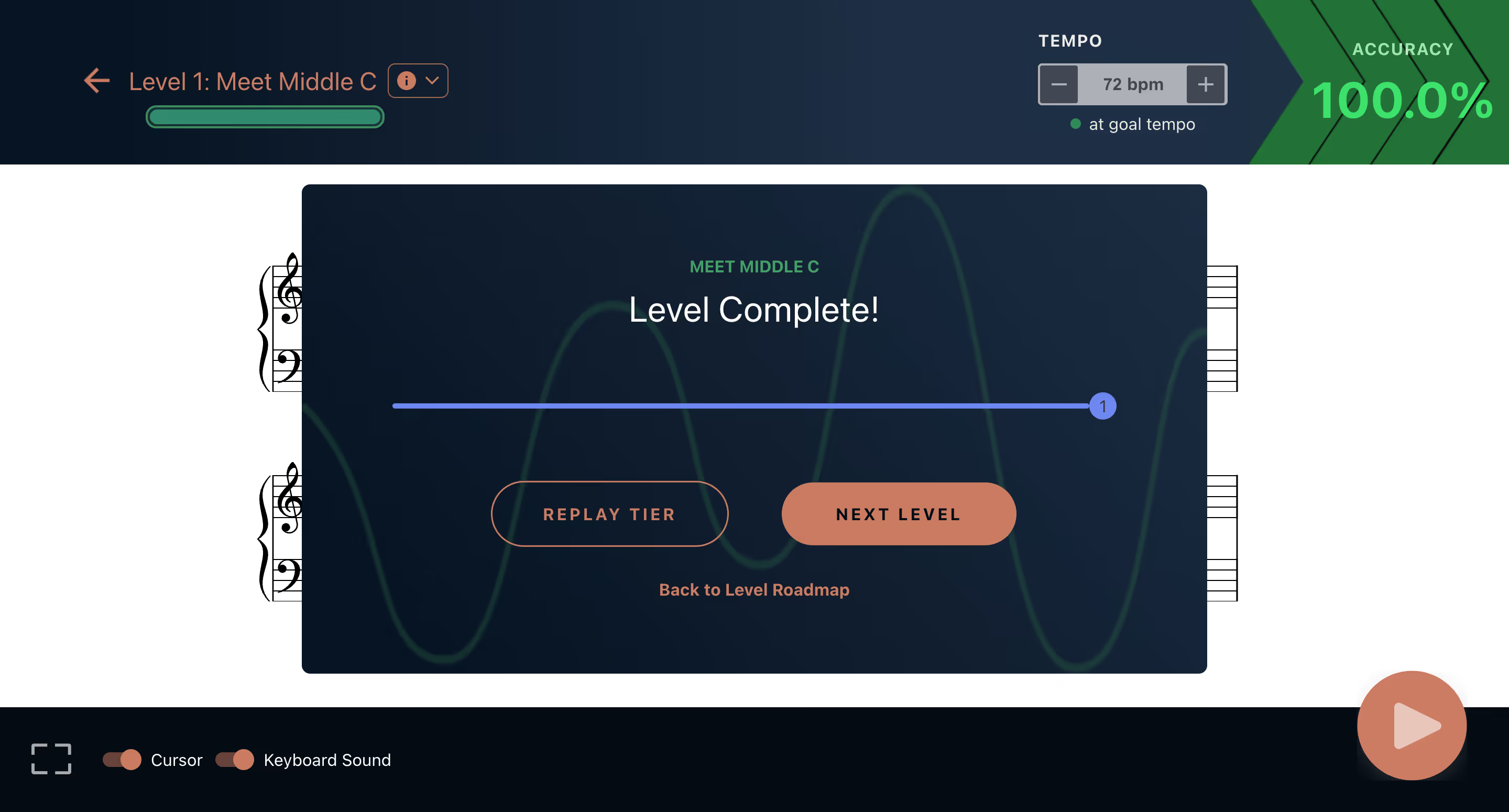
Success Stories: Students Who Found the Fastest Way
To understand why MuseFlow represents the fastest way to learn piano as a complete beginner, it's helpful to compare the typical learning trajectories of different approaches. These comparisons reveal the dramatic acceleration possible with modern, scientifically-informed methods.
MuseFlow users consistently report breakthrough progress that surpasses traditional methods:
Sarah shared:
"Within three months of starting MuseFlow, I was reading music I never thought I could handle. The difference was incredible."
Marcus explained:
"In six months with MuseFlow, I learned more than I had in two years of regular lessons. It didn't even feel like work."
Jennifer noted:
"The biggest change was that I could finally learn pieces on my own. It's incredibly liberating."
David observed:
"I used to force myself to practice. Now I get excited about my MuseFlow sessions."
These transformations demonstrate how the fastest way to learn piano creates genuine musical independence rather than dependence on teachers or specific pieces.
For more inspiring journeys, explore our success stories of students who mastered piano with MuseFlow.
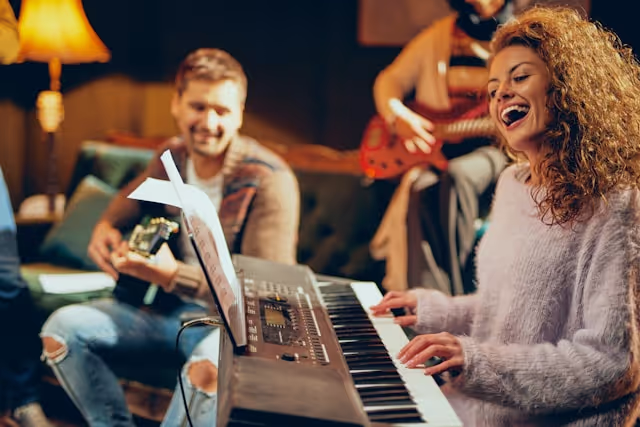
Getting Started: Your Fast Track to Piano Mastery
Ready to experience the fastest way to learn piano as a complete beginner? Here's your roadmap:
Essential Equipment
- Digital piano or MIDI keyboard that connects to your device
- MuseFlow app with guided setup process
- Quiet practice space for focused sessions
Optimizing Your Practice
- Focus on quality over quantity in practice sessions
- Aim for consistent daily practice rather than long, infrequent sessions
- Use achievement system to set specific session goals
- Pay attention to feedback and adjust playing accordingly
Building Long-Term Skills
The sight reading abilities you develop will enable exploration of any musical style. You're building skills that serve you throughout your musical life, not just learning isolated pieces.
The app grows with you, providing increasingly sophisticated challenges as abilities develop.
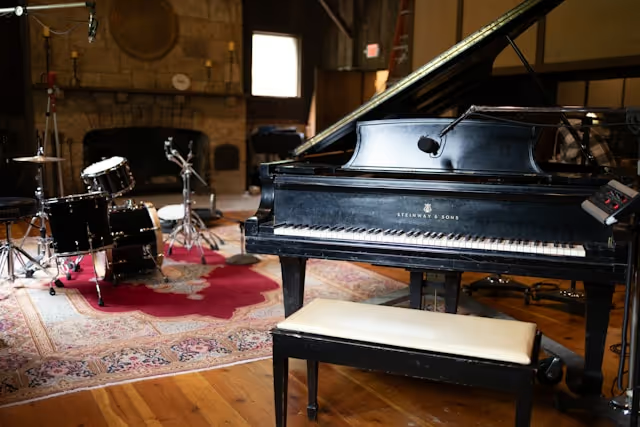
Why 2025 Is the Perfect Time to Start
The convergence of learning science, technology, and educational innovation has created unprecedented opportunities:
Technological Maturity
- Advanced learning features now accessible to anyone
- Reliable, responsive technology that maintains flow state
- Cloud-based systems for seamless progress tracking
Scientific Understanding
- Decades of research inform effective educational approaches
- Evidence-based design optimizes learning experience
- Integration of flow state, feedback, and motivation principles
Educational Paradigm Shift
- Move toward learner-centered, engaging approaches
- Recognition that learning should be intrinsically motivating
- Emphasis on transferable skills over rote memorization
To understand how this approach addresses learner needs, read about what music learners really want and how MuseFlow delivers.
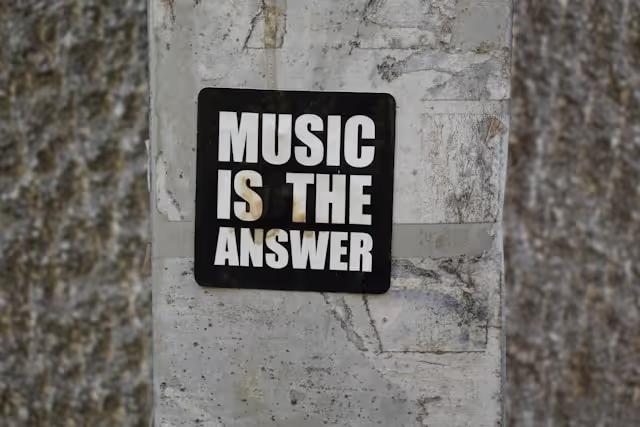
Conclusion: Your Journey to Piano Mastery Starts Now
The fastest way to learn piano as a complete beginner in 2025 is clear: MuseFlow's revolutionary sight reading-first approach combined with cutting-edge learning technology and engaging gamification.
What is the fastest way to learn piano? The answer lies in building foundational sight reading skills through immediate feedback, optimal challenge levels, and intrinsic motivation. MuseFlow has perfected this approach.
The fastest way to learn piano as a complete beginner doesn't require years of tedious exercises or expensive private instruction. With MuseFlow, you can begin developing real musical skills from your very first session.
The success stories demonstrate the transformative power of this approach. Students who struggled for years with traditional methods often achieve breakthrough progress within months of starting with MuseFlow.
But perhaps most importantly, MuseFlow changes your relationship with learning itself. Instead of viewing practice as obligation, you'll discover the joy of musical discovery and achievement.
The fastest way to learn piano in 2025 is available to you right now. You don't need to wait for perfect circumstances. With MuseFlow, you can begin your accelerated journey to piano mastery today.

Ready to discover just how fast you can learn piano? Your journey to musical mastery begins with a single note, a single lesson, and a single decision to embrace the most effective learning method available.


.jpg)

